
Revenue
$600.00M
2023
Valuation
$9.50B
2021
Growth Rate (y/y)
33%
2024
Funding
$921.54M
2023
Revenue
Sacra estimates that Gusto generated $600M of revenue in 2023, up 33% from $450M in 2022.
Gusto’s revenue has two components:
- High margin subscription revenue from SMBs using its payroll and HR services
- Low margin commission revenue from insurance carriers for selling medical, vision, dental, and life insurance
Valuation
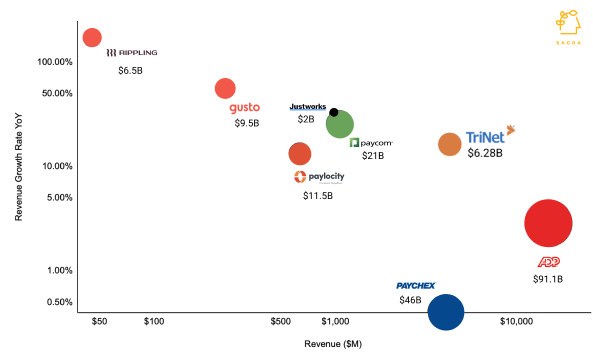
Product
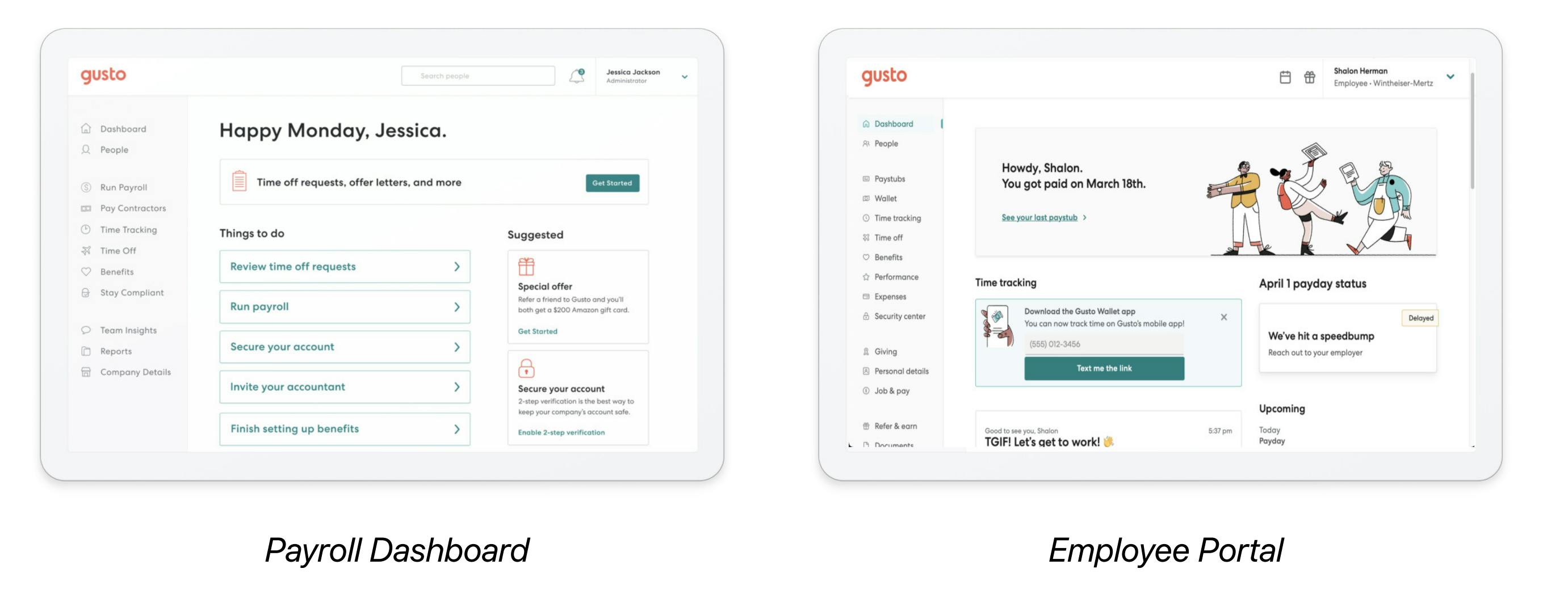
Gusto was launched in 2012 by Josh Reeves, Tomer London, and Edward Kim as a payroll product for SMBs that replaced paper-based payroll with a modern, web-based UI. Gusto gave both companies and employees a web portal that they could use to check up on payroll, update their information, download their pay stubs, and more. Today, there are three core aspects of the Gusto’s product: payroll, ecosystem, and fintech.
Payroll: Payroll is Gusto’s core product with features for SMBs such as automated tax filing with the Government agencies, integrations with other SMB tools such as Xero, QuickBooks and Clover, and easy to understand pricing. Initially built only for employees, Gusto’s payroll product now also allows paying contractors in 80 countries.
Ecosystem: Gusto has used the employee portal to expand into HR services such as hiring & onboarding, time tracking, tax, insurances, and other benefits. Benefits are offered as bolt-ons to all pricing plans. Acquisitions like Ardius (R&D tax credits) and Symmetry (tax-withholding compliance) plug into the core payroll product but offer additional services on top.
Competition
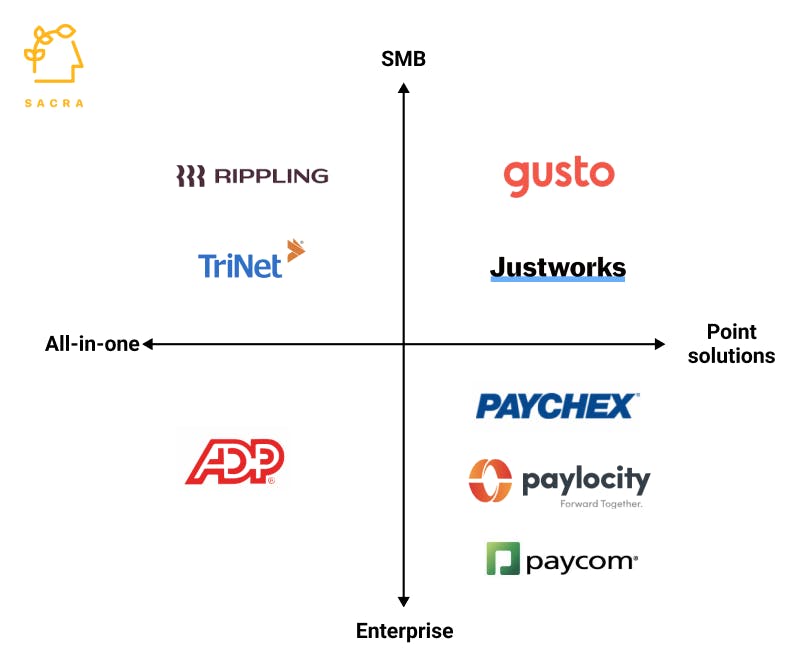
Gusto is an SMB-focused payroll product that has expanded into adjacent services through strategic acquisition and an ecosystem approach, primarily by partnering with companies that integrate with payroll. In contrast to Gusto are all-in-one HR solutions like Rippling with ambitions to eat up every people-related use case, including e.g. IT and expense management—but which don’t integrate with as many other services in turn. On the other hand, there are the enterprise payroll companies like ADP and Paychex that have SMB starter products.
Enterprise payroll companies: Two of the largest players here are ADP ($91B market cap) and Paychex ($46B market cap) which represent about ~20% of SMBs between them. They sell their SMB solutions, ADP RUN and Paychex Flex, via a SaaS-style pricing model similar to Gusto.
All-in-one HR solutions: Rippling and TriNet are two of the largest competitors in this space and both offer more feature-rich products than Gusto. Like Gusto, Rippling, started from payroll but has aggressively scaled-up to become an all-in-one HR solution that manages employee onboarding to offboarding.
TriNet and Rippling can both offer more services as PEOs (Professional Employer Organizations). By co-employing employees in a single pool, they can get scale economics on benefits and insurance plans and critically, make it easier for companies to hire remotely.
TAM Expansion
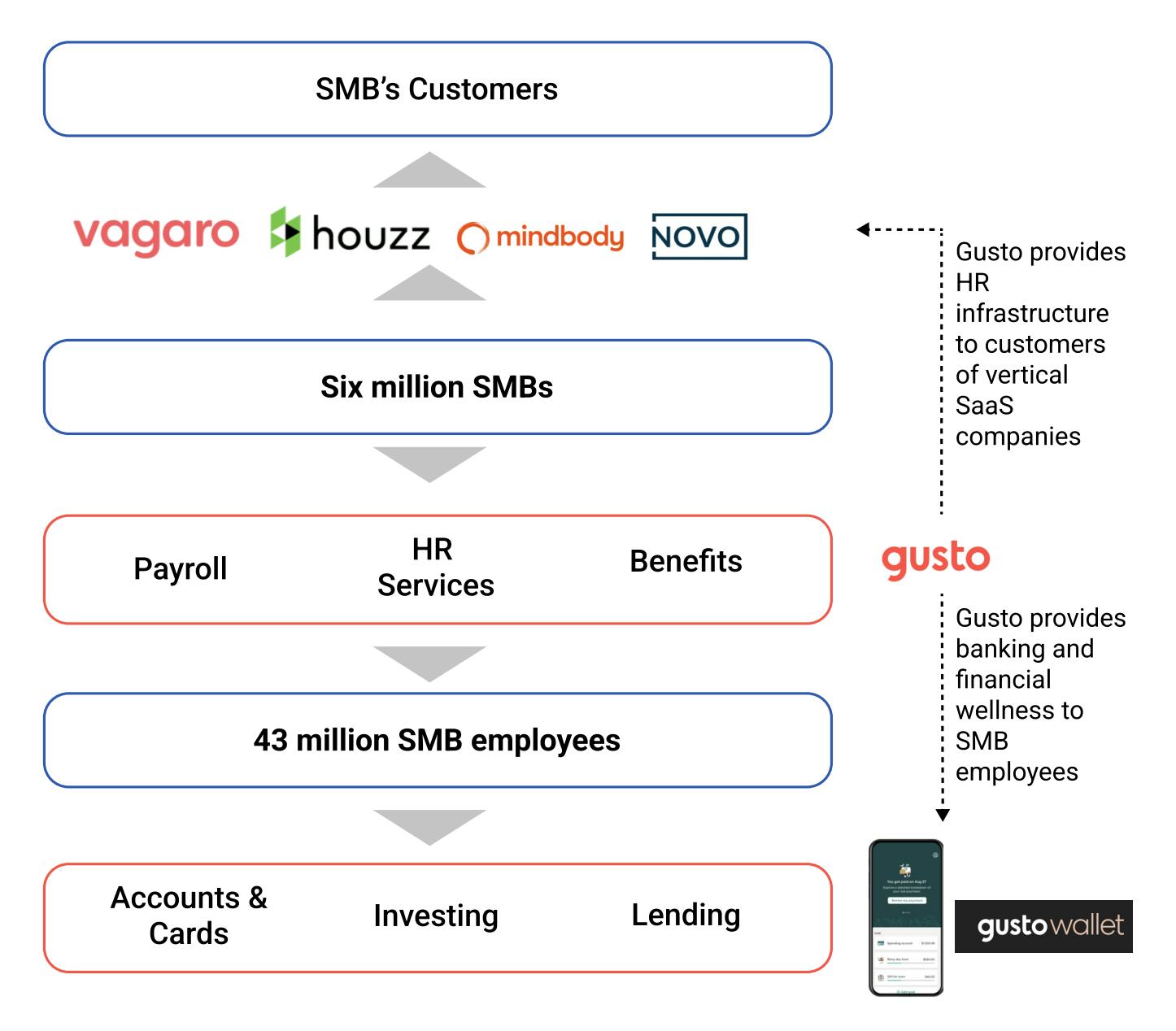
Embedded payroll
Gusto is offering payroll APIs through Gusto Embedded Payroll to SaaS startups such as Vagaro (salon and spa) and Houzz (home redecorating), and companies adjacent to payroll such as Xendoo (bookkeeping) and Timesheets (time tracking). Gusto can expand APIs to offer full stack HR services to SaaS companies that want to be more deeply embedded in their customer’s workflows.
Fintech.
Gusto is offering direct paycheck deposits, cards, and interest bearing accounts through Gusto Wallet and can expand into investments, lending, and P2P payments. Employees regularly use Gusto’s employee portal for pay stubs and benefits, which makes it easier for Gusto to sell them financial services, an advantage over other neobanks such as Chime, Acorns, and Juno. Banking products also provide Gusto another higher margin revenue stream.
Global payroll.
COVID accelerated the trend of remote employees/contractors spread across different countries. Today there's an 83% increase in job posts mentioning time/location flexibility in 2021 compared to 2019.
Deel, which started out focused on the use case of paying international contractors, has raised $629M behind its vision of a unified platform for both global and domestic payroll. Gusto’s recent acquisition of Remote Team (HR services for international employees) can help it scale up, but given that it’s coming from behind, its upside may be limited.
Risks
Scaling an ops-heavy core business: Payroll products like Gusto are operations heavy, and therefore the quality of the customer experience is partly dependent on the specific representatives that a team ends up dealing with. This poses a risk to Gusto’s ambitions to scale, because it’s difficult to scale a consistent user experience for an ops-heavy business.
Commoditization of payroll: Vertical SaaS products and other adjacent companies to Gusto can use API rails from the likes of Check (backed by Stripe; valuation: $725M), Pinwheel (backed by Coatue; valuation: $500M) and Atomic to integrate payroll and back-office functionalities just as they use BaaS startups like Bond, Lithic and Highnote to integrate card issuing and various fintech features.







Fundraising
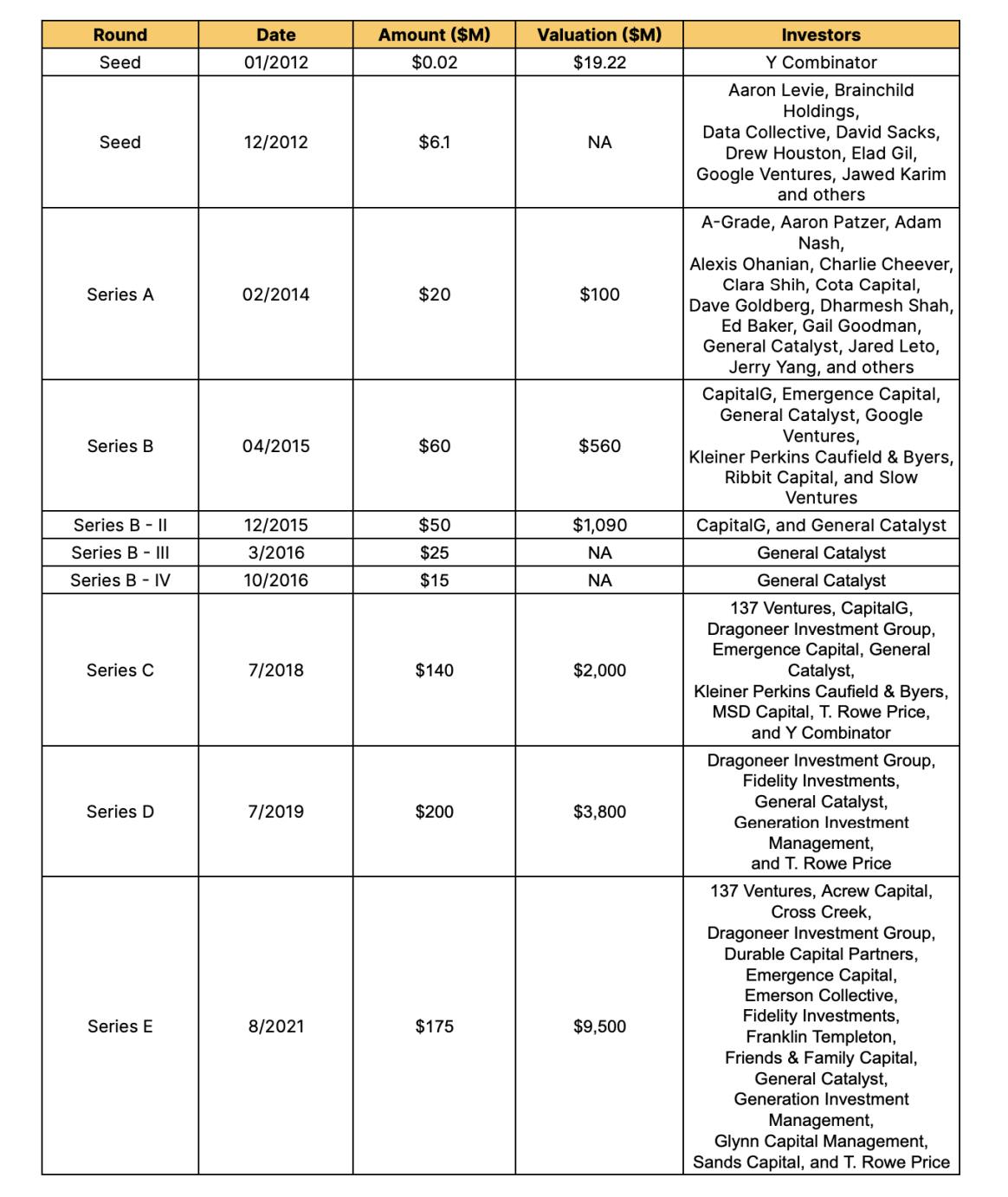
Funding Rounds
|
|
|||||||||
|
|||||||||
|
|
|||||||||
|
|||||||||
|
|
|||||||||
|
|||||||||
|
|
|||||||||
|
|||||||||
|
|
|||||||||
|
|||||||||
|
|
|||||||||
|
|||||||||
| View the source Certificate of Incorporation copy. |
News
DISCLAIMERS
This report is for information purposes only and is not to be used or considered as an offer or the solicitation of an offer to sell or to buy or subscribe for securities or other financial instruments. Nothing in this report constitutes investment, legal, accounting or tax advice or a representation that any investment or strategy is suitable or appropriate to your individual circumstances or otherwise constitutes a personal trade recommendation to you.
This research report has been prepared solely by Sacra and should not be considered a product of any person or entity that makes such report available, if any.
Information and opinions presented in the sections of the report were obtained or derived from sources Sacra believes are reliable, but Sacra makes no representation as to their accuracy or completeness. Past performance should not be taken as an indication or guarantee of future performance, and no representation or warranty, express or implied, is made regarding future performance. Information, opinions and estimates contained in this report reflect a determination at its original date of publication by Sacra and are subject to change without notice.
Sacra accepts no liability for loss arising from the use of the material presented in this report, except that this exclusion of liability does not apply to the extent that liability arises under specific statutes or regulations applicable to Sacra. Sacra may have issued, and may in the future issue, other reports that are inconsistent with, and reach different conclusions from, the information presented in this report. Those reports reflect different assumptions, views and analytical methods of the analysts who prepared them and Sacra is under no obligation to ensure that such other reports are brought to the attention of any recipient of this report.
All rights reserved. All material presented in this report, unless specifically indicated otherwise is under copyright to Sacra. Sacra reserves any and all intellectual property rights in the report. All trademarks, service marks and logos used in this report are trademarks or service marks or registered trademarks or service marks of Sacra. Any modification, copying, displaying, distributing, transmitting, publishing, licensing, creating derivative works from, or selling any report is strictly prohibited. None of the material, nor its content, nor any copy of it, may be altered in any way, transmitted to, copied or distributed to any other party, without the prior express written permission of Sacra. Any unauthorized duplication, redistribution or disclosure of this report will result in prosecution.